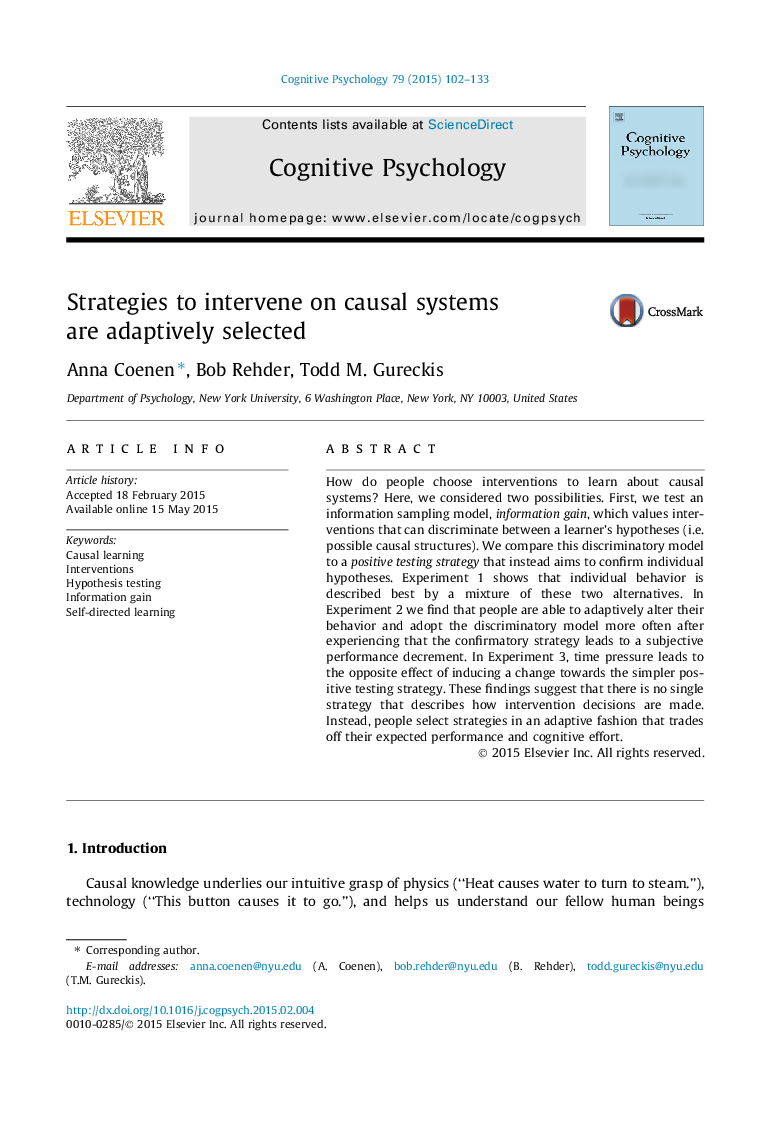| کد مقاله | کد نشریه | سال انتشار | مقاله انگلیسی | نسخه تمام متن |
|---|---|---|---|---|
| 7272793 | 1473385 | 2015 | 32 صفحه PDF | دانلود رایگان |
عنوان انگلیسی مقاله ISI
Strategies to intervene on causal systems are adaptively selected
ترجمه فارسی عنوان
استراتژی های مداخله در سیستم های علی دارای سازگاری هستند
دانلود مقاله + سفارش ترجمه
دانلود مقاله ISI انگلیسی
رایگان برای ایرانیان
کلمات کلیدی
یادگیری علمی، مداخلات، آزمایش فرضیه، به دست آوردن اطلاعات، یادگیری خودآموز،
ترجمه چکیده
چگونه مردم برای مداخله در مورد سیستم های علی انتخاب می کنند؟ در اینجا، ما دو فرصت را در نظر گرفتیم. اول، ما یک مدل نمونه گیری اطلاعاتی، اطلاعاتی را که آزمون های مداخله ای را می توانیم بین فرضیه های یادگیرنده (به عنوان مثال ساختارهای احتمالی) محاسبه کنیم، مورد آزمون قرار می دهیم. ما این مدل تبعیض آمیز را به یک استراتژی مثبت تست مقایسه می کنیم که به جای آن فرضیه های فردی را تایید می کند. آزمایش 1 نشان می دهد که رفتار ترکیبی از این دو گزینه بهتر است. در آزمایش 2 ما متوجه می شویم که مردم می توانند رفتار خود را تغییر دهند و مدل اغلب تبعیض آمیز را پس از تجربه نشان دهند که استراتژی تایید منجر به کاهش عملکرد ذهنی می شود. در آزمایش 3، فشار زمانی منجر به اثر متقابل تغییر الگوی تغییر استراتژی تست ساده می شود. این یافته ها نشان می دهد که هیچ استراتژی واحد وجود ندارد که توضیح دهد چگونه تصمیم گیری مداخله صورت می گیرد. در عوض، افراد به شیوهای انطباقی استراتژی را انتخاب می کنند که عملکرد پیش بینی شده و تلاش های شناختی را در بر می گیرد.
موضوعات مرتبط
علوم زیستی و بیوفناوری
علم عصب شناسی
علوم اعصاب شناختی
چکیده انگلیسی
How do people choose interventions to learn about causal systems? Here, we considered two possibilities. First, we test an information sampling model, information gain, which values interventions that can discriminate between a learner's hypotheses (i.e. possible causal structures). We compare this discriminatory model to a positive testing strategy that instead aims to confirm individual hypotheses. Experiment 1 shows that individual behavior is described best by a mixture of these two alternatives. In Experiment 2 we find that people are able to adaptively alter their behavior and adopt the discriminatory model more often after experiencing that the confirmatory strategy leads to a subjective performance decrement. In Experiment 3, time pressure leads to the opposite effect of inducing a change towards the simpler positive testing strategy. These findings suggest that there is no single strategy that describes how intervention decisions are made. Instead, people select strategies in an adaptive fashion that trades off their expected performance and cognitive effort.
ناشر
Database: Elsevier - ScienceDirect (ساینس دایرکت)
Journal: Cognitive Psychology - Volume 79, June 2015, Pages 102-133
Journal: Cognitive Psychology - Volume 79, June 2015, Pages 102-133
نویسندگان
Anna Coenen, Bob Rehder, Todd M. Gureckis,
